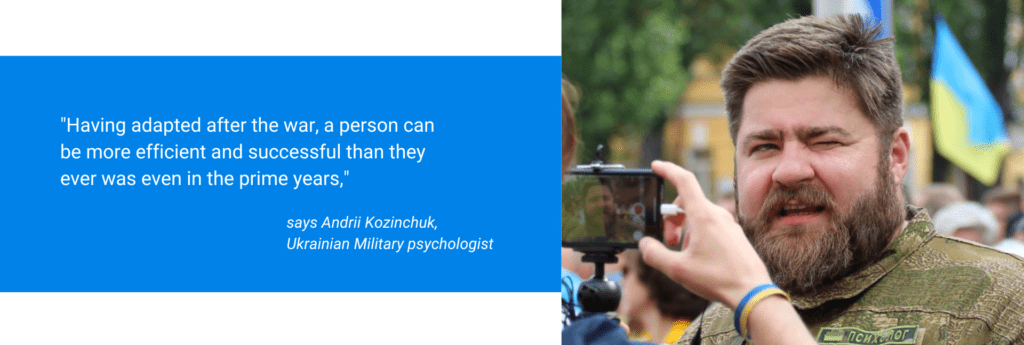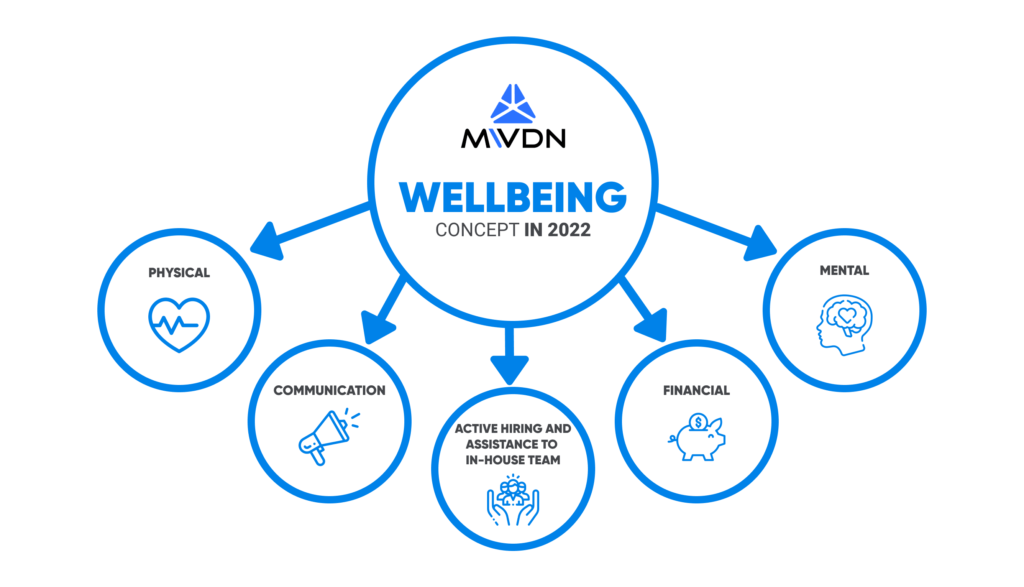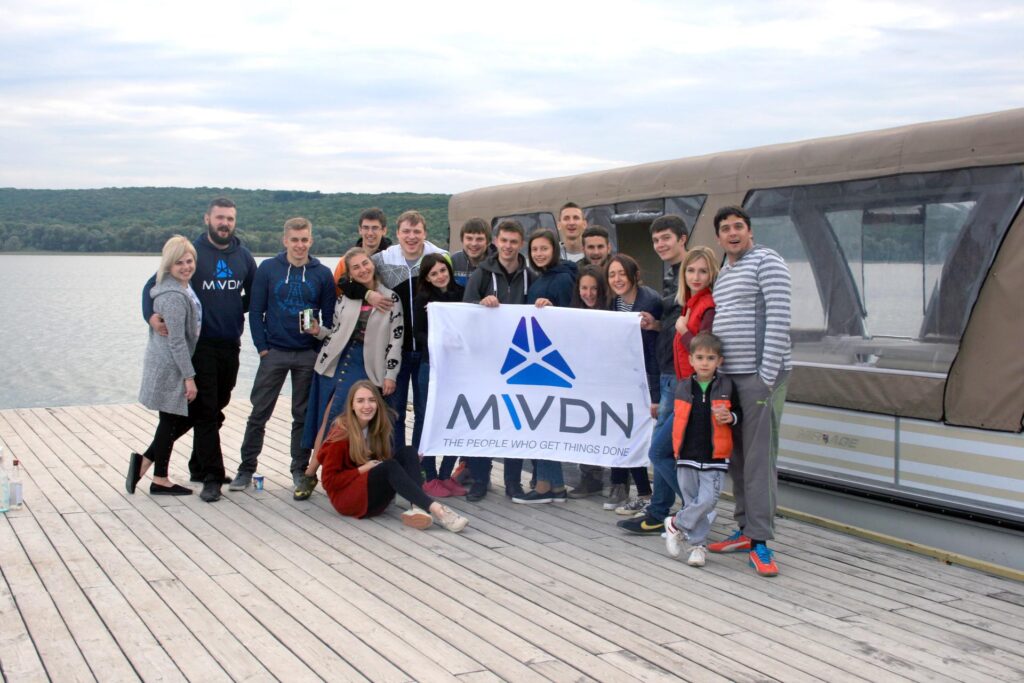
“If health is the essence of your brand, it all starts with taking the health of your workforce very seriously.”, said Marnix Eikenboom, President of Danone.
No doubt. The problem is we live in a world where the well-being of our employees depends on something more than work-life balance and visits to the gym. More and more, it feels like the world got so unpredictable that the concept of well-being is quite illusional. Ukrainians, who have been living in a different reality for already 6 months, were the first to get this feeling.
Ukraine is the biggest R&D center for MWDN and a major source of quality talents for our clients around the world. Maintaining productive cooperation for many years, our team shared the feeling of a deep mental shock that came with the beginning of the war in Ukraine.
In a way, we found ourselves between two fires: on the one hand, our customers are guaranteed to get timely and quality services no matter what; on the other, we had to take care that people who have been performing them well for years are safe both physically and psychologically.
This article tells about the best practices our HR team implemented to preserve the psychological resilience of our team. Hardened by war, these practices will be relevant both in extreme and trivial extreme conditions.
The life always finds a way
Those teammates who stay in Ukraine say that people no longer wear masks. There is no news about new strains of the coronavirus on TV, no speculations about spicy political expressions, and no gossiping about some extravagant outfits of the stars.

They say “Happiness can be found even in the darkest of times.” Similarly, Ukrainian cities live and function, outside people work, have fun, chill in cafes, and joke around to return to their life sense of normality. In the end, WAR IS NOT NORMAL but adapting to a new reality, even a horrible one, is fine.
Being a digital-savvy county with a flexible taxation system, Ukraine is still in 24th place among the 55 most attractive countries where companies and IT specialists can maximize their income. The world continues to request the services of around 200,000 IT engineers who can produce high-end solutions. Even amid the war, companies in Ukraine attract new clients and nearly 60% expect that they will grow up to 30%.
In fact, every fifth company on the Fortune 500 uses the services of Ukrainian companies.
And no, there is nothing supernatural about it. “Witnessing the beginning of the war, we found many of our colleagues working on projects just as nothing happened, putting as much effort into projects as they usually do,” says Nataliia Troian, HR Manager at MWDN.
As a company, we certainly appreciated their loyalty and work ethic. No question that it’s good both for us and our clients. But on the other hand, we looked at the question of how this dedication can affect their psychological well-being in the long run and started to make a plan.
Priorities that were identified
As a global outstaffing provider, we recruit 20% of Ukrainian specialists both in dedicated and augmented teams for 30 different clients in 5 countries. As a team, we have been creating quality services for our clients for many years. It was important for us to take care that employees can perform their duties and remain productive..
Meanwhile, very soon it became clear that many of these people are facing circumstances that many have never faced even in their lives. Nearly 41% of our team immediately decided to leave the country, while 59% decided to stay in Ukraine. Some of them, unfortunately, even got under occupation, but we are very happy that right now they are safe.
During wartime, people face many traumatic events. According to research, it increases the likelihood of developing mental health problems such as post-traumatic stress disorder (PTSD), anxiety and depression, and impaired quality of life in adulthood.
On the other hand, having adapted after the war, a person can be more efficient and successful than they ever were even in their prime years, says in a recent interview by Andrii Kozinchuk, a Ukrainian Military psychologist.

Regardless of the severity of the trauma, the adaptation process can be laborious. In this regard, family, friends, colleagues, and the closest environment should become the biggest source of support and a place where the person can talk about their feelings.
We approached this task with special responsibility and developed a plan to support both in-house and outside personnel; Ukrainians and everyone who just find themselves in a bad place. In addition to psychological assistance, it also included several other stages.
We took the possible start of the war in Ukraine very seriously to be able to keep business continuity for our customers no matter what. However, the lesson we learned for ourselves is that you can’t be 100% ready for war, and that’s why we had to act quickly.
Financial support
At the beginning of the war, all employees without exception received financial assistance from the company in the form of additional rewards and advance payments of wages.
Assistance to refugees and internally displaced people (IDP)
In addition to financial assistance, all those who were forced to leave their homes and move to other countries also needed legal support. Being abroad at such a difficult psychological moment, one may face various problems from finding housing and receiving social assistance from the state to even worse problems. Thus, all employees had the opportunity to receive legal consultation from a lawyer at meetings organized by a company.
Health support
Ensuring the physical and mental health of employees is our main priority not only in wartime but also during peacetime.
Increased hiring of Ukrainians
At the beginning of the war, we realized that many talented people would be out of work due to the closing or even the destruction of local companies. A very important priority for us was a significant increase in the number of Ukrainians as they do every possible effort to help their country, not only by serving in the premium but also financially.
Learn how Ukrainian civilians raised money for 4 bairaktars for Ukrainian Arm Forces in 3 days and how you can help.

Employee and staff psychological support tips
Don’t be silent
“As a company, we determined that in this situation, we don’t support an image of “toxic positivity” or remain silent about what happened. No question that it shouldn’t interrupt or even influence the work process but, simultaneously, in-house, we don’t pretend as if nothing is happening and don’t make everyone around silence their emotions. It never works. Instead, we take care that people have dedicated hours in their schedule to discuss their feelings beyond tasks and work meetings with a client,” adds Nataliia.
That is true. Researchers prove that this type of behavior can be harmful to both physical and mental health and disrupt teams’ productivity severely. To provide professional assistance to employees, MWDN also organized a webinar: “The psychological state during the war: how to help themselves and their loved ones.”
Breaking through the survivor syndrome
You know that people often tend to feel guilty when they find themselves safe after some traumatic event. This is also referred to as the survivor syndrome. During the war, people began to ask themselves why someone suffered and not themselves. Nothing is self-harming about it as it’s a common reaction among:
- war veterans
- Holocaust survivors
- those who have survived serious diseases
- car crashes
- natural disasters
- witnesses of a traumatic event
- those who lose a close person to suicide
- parents who outlive their child (and even vice versa)
Professionals say this almost always results in compensation syndrome.
“At first I tried to do it with alcohol – it didn’t work, so I went to work long hours, but my performance dropped. As a result, I was recommended to a supervisor, a military psychologist who also served in the army. And he said that when I have a rest, it’s also a part of my work”, – Andrii Kozinchuk explores the topic further.
That is why employers need to pay attention to overtime work and make sure it is not spurred by surviving trauma.
Praise their accomplishments
A person who has survived a trauma does not want to feel pity or condescension. Praise is nice, but it must be objective and reflect their real successes. In a recent study, 27% of employees indicate the lack of recognition and rewards as an important reason to leave an employer.
It is not difficult, each of the people around at work has their strengths — the main thing is to learn to notice them. Thus, it is highly recommended to practice in your team both:
- Peer-to-peer
- Manager to employee recognition
Recognize the signs of distress and be there to help
A person who survived or witnessed trauma might bear a lot of responsibility and be proactive but simultaneously be broken inside.
The signs may include both workaholism and evenings spent at work, as well as tardiness, loss of motivation, and loyalty to the project.
This colleague may lose interest in communication and distance themself from the rest of the team. Ignoring this may fail to perform the job and responsibilities.
The work, in this case, should start with a one-on-one conversation and identify the reasons and options for solving this problem.
“In MWDN, we nurture the atmosphere of mutual support and honest conversations. We talk to identify the problem and find a timely solution to a problem. In the end, I think, this is what helps us to retain professionals with such success. We are proud that as a team, we can get through the war and other hardships together,” adds Nataliia.

Contact MWDM — use a chance to meet some brilliant minds behind our best projects.
